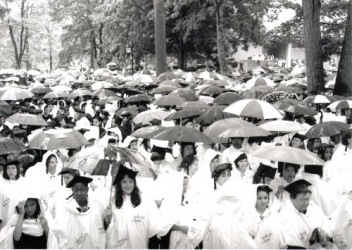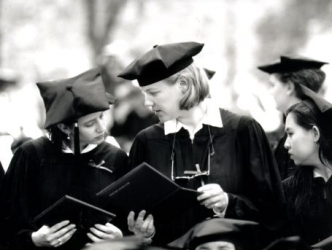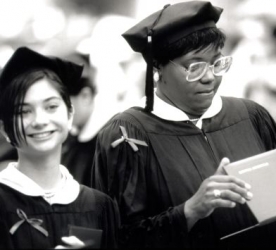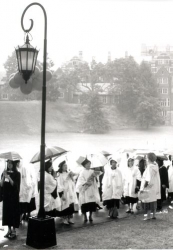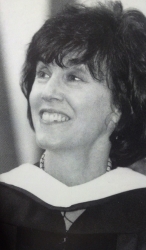President Diana Chapman Walsh's Charge to the 1996 Senior Class
"All serious daring starts from within."
So ends a lovely book, One Writer's Beginnings, by Eudora Welty, another of our fine (and funny) woman writers, in the company of our guest speaker today. "As you have seen," Welty concludes her 1983 memoir, "I am a writer who came of a sheltered life. A sheltered life can be a daring life as well. For all serious daring starts from within."
The three chapter headings of Welty's book -- and that closing thought -- encapsulate what it is you graduating seniors have been doing in the shelter of Wellesley College these past -- and packed -- four years: "Listening," "Learning to See," and "Finding a Voice."
Eudora Welty visited this campus in the winter of 1964, spoke in Alumnae Hall, visited a creative writing class, and, the next afternoon, had tea (in the Wellesley way) with a small and admiring group of English majors. I was at all three events, 32 years ago, and I've carried that brief encounter with me all these years. It was one of those signal experiences that is a small part of the person I became.
As you leave this College (later this afternoon), you will carry with you not only the astounding accumulation of stuff you've been packing all week (where did it all come from?), but also many encounters from your four years here. Some will stay with you throughout your lives, wherever you go, whatever you do, whoever you become.
Some of those are salient enough that you know right now -- if you pause for just a moment -- which ones they will be: experiences forever seared into your memories. Others will sneak up on you to become important later, in ways --and for reasons -- you can't imagine now., reasons that will find their meaning as your life unfolds.
The encounters you carry with you from your Wellesley years will sometimes inspire you, supplying confidence when you need it to get on with the unending project of becoming that fuller person you began to incubate here.
Some will console you. You'll be tired or dispirited, and a memory of Wellesley (a teacher who believed in you more than you did in yourself, a friend who supported you when you felt alone and afraid, an achievement that amazed you, amplified inner resources you didn't know you had) -- those Wellesley memories will restore the flagging resilience and the tenacity every one of you discovered in yourself, and cultivated here.
Often, the encounters that will stay longest with you will be those that become enduring touchstones for who you are (I am a person who meets my commitments, a person who doesn't give UP, a person who extends a hand to others who need my help, a person who never stops questioning, a person of bedrock integrity, a person of convictions) -- expressions of your deepest aspirations, of your essence -- your most serious daring, the daring from within.
Occasionally, the baggage you carry from this place will chide and discomfort you for failing in some way to meet expectations you've set for yourselves, as Wellesley women intent on improving the world.
There will be such moments -- yes, even for you -- the incREDible class of 1996 (a class with prodigious stores of talent, drive, and passion). Even you will have setbacks and moments of self-doubt. But they will not divert you from the serious daring of which you have shown us -- over and over again -- you are fully capable, the daring we know you will do out in the world.
My overriding memory from Eudora Welty's visit was of an elegant Southern gentlewoman who seemed fundamentally shy, and yet was a commanding presence, softspoken, introspective, charismatic in her quiet way.
People who are shy, according to the work of our own Professor Jonathan Cheek, shy people have a tendency to wonder "who does this situation want me to be," rather than "how can I be me in this situation?" Writers who are shy (as many are) are monitoring those inner voices for answers of a different sort -- -lessons about living and life they can transform into art. Listening, Learning to See, and Finding a Voice.
The listening I've seen you seniors doing in your time here at Wellesley -- the listening I hope you'll carry out into your lives -- is the kind of listening a writer does, the daring kind that plunges you into new situations, an individual rooted firmly in the person you know yourself to be, but one willing to emerge from any encounter changed, enlarged by having opened yourself to a new opportunity to learn and to grow.
And how have you learned to see, in your time here at Wellesley? What skills of observation will you carry from this place? You've learned here, I hope, the disciplined life of the mind. You've learned to be open always to new evidence, thrown up against clearly specified standards of validity and inquiry, in an iterative and never ending search for provisional truth. "No experiment can ever prove me right," Einstein used to say. "A single experiment can always prove me wrong."
You've learned to listen well for counter arguments, to sift through them with a blend of skepticism and curiosity, to incorporate new bits of evidence or new arguments you may not have encountered before, or ones you may see in a new light as a result of exposure to new experiences, new perspectives, new world views.
That is why our diversity -- in all its manifestations -- is so essential to the work that engages us here. Our work -- -the seeking of truth -- requires that we expose our assumptions, biases, and ignorance to challenges that will yield more complicated, more refined, and more complete understandings of the world. We treasure and thank you -- -members of the Class of '96 -- for the diversity of gifts, experiences, and spirit you have brought to Wellesley and shared with us here. Wherever you go, please be sure, always, to honor and celebrate diversity.
And what of finding a voice? How will you speak out in the world after you leave this place? Here on this campus you have shown yourselves to be the kinds of women leaders we witnessed in Beijing, women who form fluid circles of inclusion rather than the rigid lines of demarcation that have caused so much of the world's violence, inhumanity, and pain. We know you will be voices for reason, voices for tolerance, inclusion, and justice, voices for the better world we're counting on you to lead.
You're leaving here to enter a broken and confusing world, one that needs your energy, your commitment, and your caring -- the caring that has balanced the daring you've done here. We send you out into the world with our admiration, with our pride, with our love, with our heartfelt hopes for your happiness and with our deep aspirations for the better future we are certain that you represent.
God speed to you all.

